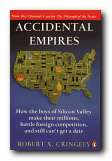Amusing history of computers and the Internet
This book has two sub-titles: ‘The Triumph of the Nerds’ and ‘How the boys of Silicon Valley make their millions, battle foreign competition, and still can’t get a date’. You can see that Robert Cringely takes an irreverent attitude to his study of Internet history and computer development in the US. He looks at it in terms of business enterprise, scientific development, and as a collection of extraordinary and eccentric characters who were once skipping classes and are now running the shop.
 His account is written in a breezy, amusing, self-deprecating style. He jumps around from one topic, one character sketch, and even one decade to another. One minute he’s tracing the history of software development, the next it’s business methods and biographical sketches of entrepreneurs. Much of his energy is spent on critiques of Chairman Bill and figures such as Steve Jobs and Steve Wozniak.
His account is written in a breezy, amusing, self-deprecating style. He jumps around from one topic, one character sketch, and even one decade to another. One minute he’s tracing the history of software development, the next it’s business methods and biographical sketches of entrepreneurs. Much of his energy is spent on critiques of Chairman Bill and figures such as Steve Jobs and Steve Wozniak.
It’s a sort of history of how it all happened – but rendered via a cubist form of narrative in which you have to reassemble the chronology yourself. Cringley is a computer magazine gossip columnist, and I’m afraid that ultimately, it shows.
What he offers is popularised science, via sound-bite journalism: “it takes thirty years, more or less, to absorb a new information technology into daily life”. These little aphorisms are sometimes amusing, but they’re just as often slightly silly, as in the basic statements on which he bases his claims for the entire book.
First, that the Internet happened more or less by accident. Second, that the people who made it happen were amateurs. Neither claim is actually true, but it suits his purpose to amuse. However, the moment you stop to think about these propositions, they evaporate immediately.
 And yet for all that he takes a jokey line, he offers lots of interesting insights – such as the reasons why some software lasts, unlike hardware which on average is replaced every three years. It’s a shame, because he is clearly well informed and at some points has interesting things to say about technological developments and even the philosophy of the internet – but his efforts are dissipated by a lack of focus. He throws off ideas and sketches topics every few pages which warrant a book in themselves, but he can’t quite make up his mind if he’s a historian of technology or a commentator on business methods.
And yet for all that he takes a jokey line, he offers lots of interesting insights – such as the reasons why some software lasts, unlike hardware which on average is replaced every three years. It’s a shame, because he is clearly well informed and at some points has interesting things to say about technological developments and even the philosophy of the internet – but his efforts are dissipated by a lack of focus. He throws off ideas and sketches topics every few pages which warrant a book in themselves, but he can’t quite make up his mind if he’s a historian of technology or a commentator on business methods.
The last two chapters are a 1996 update [made for a successful TV adaption] in which he admits the rise to power of Microsoft – but this is more business management history than an account of technological development.
The good side of Cringeley’s approach is that he offers a bracingly irreverant account of the US computer business which might encourage readers to take a sceptical view and not be overawed by Big Names. The downside is that his analytic method is anecdotal, and hit-and-miss. There is here the beginning of what I think will eventually make a fascinating study – the history of software development. Perhaps he ought to get together with a disciplined co-author [or an editor with Iron Will] and he could produce something more coherent and persuasive.
© Roy Johnson 2000
Robert X Cringley, Accidental Empires, Addison-Wesley/Viking, 2nd edition, 1996, pp.358, ISBN 0140258264
More on computers
More on technology
More on digital media


